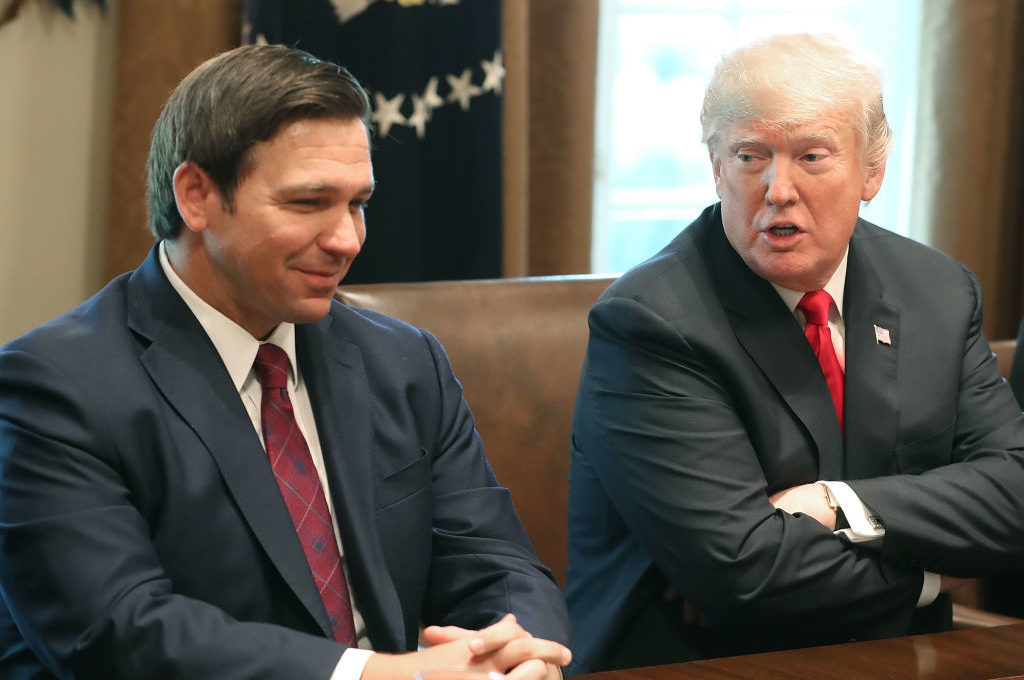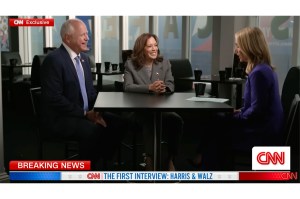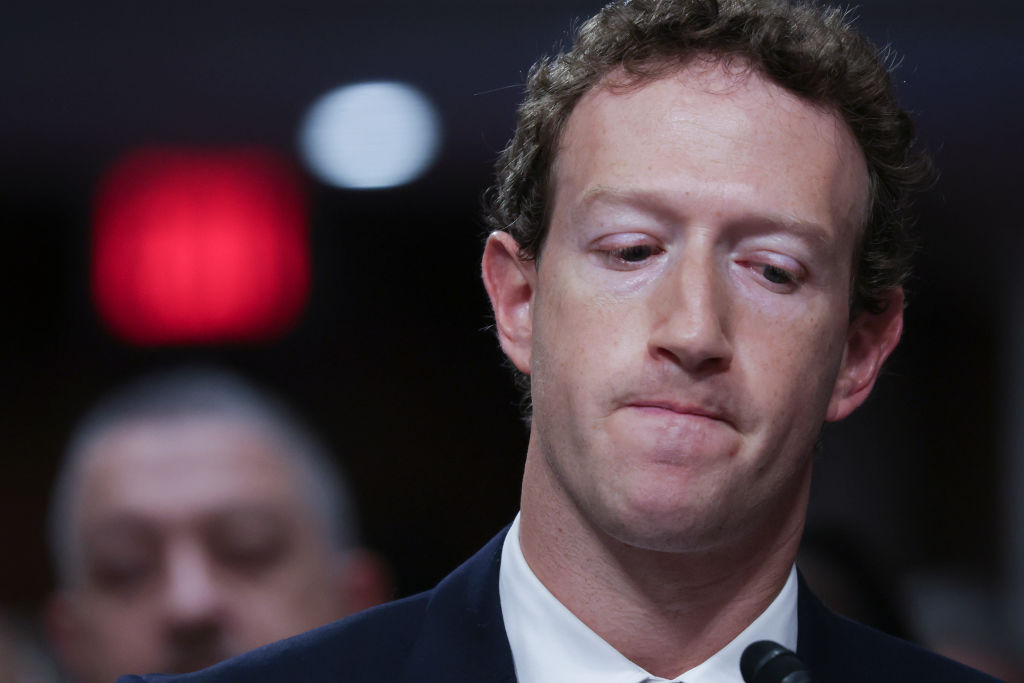Over Presidents Day weekend, Donald J. Trump, our most beloved former president — according to him anyway — posted the following to his Truth Social account: “Ron DeSanctimonious wants to cut your Social Security and Medicare, closed up Florida & its beaches, loves RINOS Paul Ryan, Jeb Bush, and Karl Rove (disasters ALL!), is backed by Globalist’s Club for NO Growth, Lincoln Pervert Project, & ‘Uninspired’ Koch — And it only gets worse from there. He is a RINO in disguise!, whose Poll numbers are dropping like a rock. Good luck Ron!”
This is as good a point as any for the launch of Thunderdome 2024, a Republican presidential primary that has all the signs of being even bloodier and more acrimonious than the 2016 contest. Just look at the stakes, the positioning of donors and activists, and — after three cruel rounds of electoral failure — a former president turned red in tooth and claw.
For the dispassionate viewer, it presents a gladiator match for the prize of running against Joe Biden. The field is strikingly different than it was eight years ago, when the money and assumptions were behind the likes of Jeb Bush and Wisconsin’s Scott Walker, and a bevy of senators and governors fought among themselves in an attempt to set up a mano-a-mano showdown with Trump — a strategy that totally backfired.
Smart Republicans have learned a lot since then. But they’re also taking on a former president who occupies a very different space than he once did: Trump and his supporters are the new GOP establishment, even as he maintains his position as its constant critic. This gives him enormous advantages, and makes Trump, despite what you may have heard, still the likeliest candidate for the Republican nomination. For those who aspire to replace him atop the ticket, it’s wise to remember that the same abiding rule that undid Hillary Clinton and aided Joe Biden is still in place: you can say anything you want about the candidates, but don’t speak poorly of their voters.
This is a problem for Trump personally, in part because he’s flailing so much over DeSantis. Trump has occupied the difficult position of claiming that the person he voted for mere months ago, whose success he lauded and whom his voters overwhelmingly like, has morphed overnight into a silly, hypocritical, lockdown-loving globalist goombah. This is a hard sell to the many Republican voters who had hoped (however absurdly) for Trump and DeSantis to get along on the way to the nomination. Even without formally entering the race, it is clear DeSantis looms the largest in Trump’s assessment of the field, and in the animosity of those who remain closest to the former president.
That closeness will be an omnipresent factor in 2024, and it could play out in unpredictable ways. When Trump descended the golden escalator in the summer of 2015, he was close with no one in the field. Now there are a host of personal connections. He literally chose to hire for critical positions three of the people likely running against him — Mike Pence, Nikki Haley and Mike Pompeo. Navigating this connection will be difficult for them, as Haley’s entry into the stakes already shows — she struggled to give an answer on the differences between her and Trump. But they may prove difficult for the former president as well, as he tries to both stand on his record and undermine those who did the work.
Pence seems on paper to be the least likely to succeed. He represents a form of polite Midwestern conservatism that the party passed by even before the culture war turned into a fiery but mostly peaceful summer of love. He has spent his time in the interim staking out serious positions on the traditional speaking circuit and appealing to his social conservative roots. But the deep animosity felt by Trump supporters toward Pence — his approval rating dropped like a rock after January 6 — is a threshold likely too high for him to overcome.
For Haley, her campaign is launching with a good deal of investment and backing from some critical players, but her script reads as if it’s unchanged from Marco Rubio’s closing argument in South Carolina in 2016. “This election is a generational choice,” he said at the time — and South Carolina overwhelmingly chose the baby boomer.
Haley has some advantages: her mere presence in the race as a conservative woman has already trolled CNN’s Don Lemon and ABC’s Whoopi Goldberg into manic episodes, and they’re likely to be the first of many. But she also has serious disadvantages: her résumé was built in the time before the hot-button culture wars over education, she has no executive record during Covid, and there is a veneer of neoconservatism to her foreign policy. In each case, Haley will struggle to disprove allegations that she is a step backward from the heated populism of the moment.
Then we turn to Mike Pompeo, who I’ve spent more time with than anyone else in this field — most recently, I profiled him for the December issue of The Spectator and interviewed him about his book for my Fox News podcast.
I think Pompeo could very well overperform in this cycle, for several reasons. Given the unnerving state of the world in the Biden era, this is a primary that may lend itself more toward national security arguments than is typically the case. Pompeo has a larger profile among the electorate than is typically seen for candidates with his DC résumé, and his brand of tough talk when taking on the media stands out in a field less experienced in that arena. He comes across as sane, grounded, and serious — and has the glad-handing Midwestern toolset that will serve candidates well in the early going. But it remains to be seen how he will navigate clashes with his old boss. How long until Trump accuses him of lying about his weight loss? Probably a week.
Now we enter the part of the field unbound by direct ties to the former president. Where 2016 saw Ted Cruz, Marco Rubio, Rand Paul and Lindsey Graham all enter the race, Tim Scott may end up being the only senator in this contest, and he is something of a wild card. His polling shows he is liked quite a bit by Republicans, but also that they don’t know much about him. This could lead to boomlets in his debate performances, but it could also turn him into everyone’s second choice. The test will be whether Scott can excite people while better defining himself to voters who aren’t sure where he stands. One advantage: as with Haley, there’s the media/left trolling component. The racial attacks Scott has withstood just during his Senate tenure will crank up the minute he gains traction. But for GOP voters, identity politics takes you only so far.
Another candidate who could rise if he’s able to define himself is Virginia governor Glenn Youngkin. He has the potential to raise significant money and occupies a unique political position in the field. While on paper he looks like a conventional pro-business Republican, Youngkin is governor by dint of his policies on culture war issues, education, and Covid — imagine a Chamber of Commerce type but with a scimitar. Youngkin has an uplifting tone to his message, one that has him getting strange new respect even from the likes of the Washington Post’s Karen Tumulty as a “sane” alternative. That may appeal to donors, but it’s fool’s gold — we all know the instant Youngkin becomes a household name, he’ll be smeared as an abortion absolutist.
As corporate-friendly governors go, Arkansas’s Asa Hutchinson has far less to recommend him. While he can stick around until the voting starts thanks to his relationships with the heirs to the Walmart fortune, he has the difficulty of hailing from a red state where there were few fights to have, and where a failure to hold the line is more evident. When Hutchinson vetoed a bill banning transgender treatment for minors, the state legislature overwhelmingly overruled his veto. He may become more known as a foil for others on the debate stage than anything else.
As for the rest of the current and former governors who may make a run, it’s hard to see them going anywhere at all. New Hampshire’s Chris Sununu may be the king of his state, but favored sons are a thing of the past. Chris Christie would be running mostly out of vengeance, which is not a typically decisive factor. And while the fine folks at NBC are doing their best to boost former Maryland governor Larry Hogan’s name ID, his appeal outside of media studios is effectively nil. Hogan was exceptionally bad on Covid, is an anti-culture-war Republican and comes across as both distant and very full of himself (and other things too).
One surprising entry to the primary stakes is young entrepreneur Vivek Ramaswamy, whose success with his Woke Inc. book and criticism of corporate wokeness has turned him into a minor celebrity on the right. Media types will likely frame him as a Republican version of Andrew Yang, but that’s not the case. If anything, Ramaswamy has more in common with Steve Forbes — a wealthy, smart success story who is spending his own money and time trying to elevate an issue he believes is uniquely important and ignored by others. Ramaswamy’s presence in the field is unlikely to accomplish more than this, but given his communication abilities, it may expose a number of fissures in the Republican-Big Business relationship that deserve time. And who knows? Maybe he’ll get to host SNL at the end of it:
This brings us back to DeSantis. The Florida Man has the advantages of name ID, definition in the minds of Republicans, and strong appeal to the Fox News and talk radio audience. He’s coming off an astounding electoral success in turning his state bright red. He’s got a charming, telegenic young family — he doesn’t need to make the generational argument because it’s right there in front of you. The money, small dollar and large, will be there for him. He’s also not Scott Walker, despite what some conservatives worry about — and he is infamous for keeping a close counsel.
As disadvantages go, DeSantis has a reputation for being more introverted and drawn in when it comes to personality, the opposite of the gregarious Trump. But in the television era, that’s less of a problem if it’s behind the scenes. The more difficult challenge: call it the “what are you willing to do?” question. In 2016, no candidate was willing to do what it would take to challenge Trump directly because they were so worried about losing his voters in some hypothetical future dynamic. This created the awkward interactions between Ted Cruz and Marco Rubio and allowed for Trump to battle the media, not his fellow Republicans, for most of the nomination fight. DeSantis must prove he’s willing to approach this primary differently, that he’ll crawl over broken glass to win. Politicians who attempt that test have a huge advantage over those who won’t.
Thunderdome 2024 won’t allow the kind of slap-fighting that dominated 2016. This time around, to be the man, you have to beat the man.

























